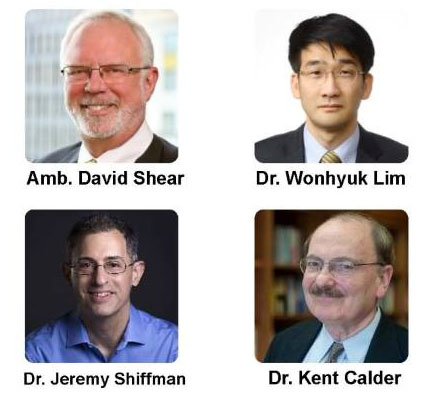Grappling with Covid-19: Policy Lessons from East Asia
Grappling with Covid-19: Policy Lessons from East Asia
 On Monday, April 20, The Edwin O. Reischauer Center for East Asian Studies hosted a virtual panel discussion of distinguished scholars and officials entitled “Grappling With Covid-19: Policy Lessons From East Asia” examining the Reischauer Center’s recent Task Force publication about how and why many East Asian countries have been effective at mitigating the effects of COVID-19
On Monday, April 20, The Edwin O. Reischauer Center for East Asian Studies hosted a virtual panel discussion of distinguished scholars and officials entitled “Grappling With Covid-19: Policy Lessons From East Asia” examining the Reischauer Center’s recent Task Force publication about how and why many East Asian countries have been effective at mitigating the effects of COVID-19
The panel included Ambassador David Shear, former Assistant Secretary of Defense for Asian and Pacific Security Affairs and U.S. ambassador to Vietnam; Dr. Wonhyuk Lim, former Associate Dean of Korea’s renowned KDI School of Public Policy and Management; Professor Jeremy Shiffman, Bloomberg Distinguished Professor at the Johns Hopkins Bloomberg School of Public Health; Ms. Neave Denny, Research Coordinator of the Reischauer Center and Japan specialist; with Moderator Dr. Kent Calder, Director of the Reischauer Center and Vice Dean for Faculty Affairs and International Research Cooperation at Johns Hopkins School of Advanced International Studies | SAIS.
Leading off the discussion, Dr. Calder raised key points regarding East Asia’s overall response to the crisis thus far, emphasizing a number of successful practices the region has undertaken (such as drive-thru testing) that have inspired emulation in other parts of the world. East Asia’s success in combating the outbreak, Dr. Calder stated, could have significant diplomatic and geopolitical implications for the region in coming years. Following this introductory statement, Dr. Lim gave remarks regarding South Korea’s effective governmental response to its coronavirus outbreak, detailing the country’s extensive testing as well as its distribution of information and medical supplies to slow the spread of the virus and reduce stress on the healthcare system.
Speaking next, Ambassador Shear gave an overview of his general observations on the crisis, emphasizing that it is too early to draw many conclusions from the pandemic while also stating that clear lines of authority and consistent government messaging appear crucial to response efforts. Professor Shiffman argued that the Covid-19 crisis entails a plethora of complicated questions, and that trust in experts is crucial to fighting the virus. Finally, Neave Denny raised the importance of identifying ways each of these countries and medical planning sectors can improve their response in preparation for the second wave. After their initial remarks, the panelists fielded a number of questions raised by Dr. Calder as well as by members of the online audience.
Categories
© 2025 The Edwin O. Reischauer Center for East Asian Studies at the Johns Hopkins School of Advanced International Studies (SAIS), a division of the Johns Hopkins University. All Rights Reserved.
Sitemap | Custom WordPress Design, Development & Digital Marketing by time4design.


